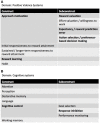A Research Domain Criteria Approach to Gambling Disorder and Behavioral Addictions: Decision-Making, Response Inhibition, and the Role of Cannabidiol
- PMID: 34603091
- PMCID: PMC8484302
- DOI: 10.3389/fpsyt.2021.634418
A Research Domain Criteria Approach to Gambling Disorder and Behavioral Addictions: Decision-Making, Response Inhibition, and the Role of Cannabidiol
Abstract
Gambling Disorder (GD) has been recently re-classified in the DSM-5 under the "substance-related and addictive disorders," in light of its genetic, endophenotypic, and phenotypic resemblances to substance dependence. Diminished control is a core defining concept of psychoactive substance dependence or addiction and has given rise to the concept of "behavioral" addictions, which are syndromes analogous to substance addiction, but with a behavioral focus other than ingestion of a psychoactive substance. The main symptom clusters are represented by loss of control, craving/withdrawal, and neglect of other areas of life, whereas in a Research Domain Criteria (RDoC) perspective, GD patients exhibit deficits in the domain of "Positive valence systems," particularly in the "Approach motivation" and "Reward learning" constructs, as well as in the "Cognitive systems," primarily in the "Cognitive control" construct. In the Addictions Neuroclinical Assessment (ANA), three relevant domains for addictions emerge: "Incentive salience," "Negative Emotionality," and "Executive Function." The endocannabinoid system (ECS) may largely modulate these circuits, presenting a promising pharmaceutical avenue for treating addictions. Up to now, research on cannabidiol has shown some efficacy in Attention Deficit/Hyperactivity Disorder (ADHD), whereas in behavioral addictions its role has not been fully elucidated, as well as its precise action on RDoC domains. Herein, we review available evidence on RDoC domains affected in GD and behavioral addictions and summarize insights on the use of cannabidiol in those disorders and its potential mechanisms of action on reward, decisional, and sensorimotor processes.
Keywords: Research Domain Criteria; behavioral addictions; cannabidiol; endocannabinoids; gambling disorder.
Copyright © 2021 Pallanti, Marras and Makris.
Conflict of interest statement
The authors declare that the research was conducted in the absence of any commercial or financial relationships that could be construed as a potential conflict of interest.
Figures
References
Grants and funding
LinkOut - more resources
Full Text Sources



